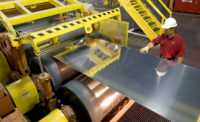Remember the nursery rhyme about the old lady who swallows a fly? She swallows a spider to catch the fly, a bird to catch the spider, a cat to catch the bird, and so on, until she finally swallows a horse and dies.
I was reminded of that story after General Motors’ announcement last fall that it will cut 15 percent of its salaried workforce and idle assembly plants in Michigan, Ohio, Maryland and Canada. The decision will result in the loss of 14,000 jobs.
GM says the cutbacks reflect a slowdown in sales and a shift in consumer demand from cars to SUVs. The automaker also says it wants to prioritize investments in electric and autonomous vehicles. However, another contributing factor is the Trump administration’s tariffs on steel and aluminum. GM says they have cost the company $1 billion, and that while they are not directly responsible for the layoffs, they are among the “headwinds” that the company is facing.
GM is not alone in that regard. Last fall, Ford’s CEO Jim Hackett said that the tariffs would cost his company $1 billion in profits. Honda North America vice president Rick Schostek reported that the tariffs have cost his company “hundreds of millions of dollars” in additional annual costs. And, the tariffs cost BMW’s South Carolina assembly plant $350 million in 2018.
GM’s cutbacks will surely impact suppliers. Ironically, one of the first dominoes to fall is a steel plant. In January, ArcelorMittal Tailored Blanks announced that it will close its factory in Pioneer, OH. The factory produces laser-welded blanks for the auto industry, and GM is one of its biggest customers. The closure will affect some 50 workers, all of whom will be offered the opportunity to relocate to other ArcelorMittal facilities.
So have tariffs worked? U.S. steelmakers made more than 95 million tons of steel in 2018, according to the American Iron and Steel Institute. That’s 6.2 percent more than the industry produced in 2017, and it’s the most since 2007.
Despite a capacity utilization rate of 78.3 percent last year, the industry is reinvesting in domestic production. For example, U.S. Steel is restarting two blast furnaces in Granite City, IL, creating 800 new jobs. Nucor is opening factories in Sedalia, MO, and Frostproof, FL, and it just announced plans to build another factory somewhere in the Midwest. Combined, the three projects represent $1.7 billion in investment and 900 jobs.
On the other hand, as we feared in 2017, steel consumers are feeling the pinch, and it’s not just the auto industry. The tariffs cost Caterpillar $100 million in 2018. And, blaming tariffs, Electrolux said that it will close an appliance assembly plant in Memphis, TN, and delay plans to expand a plant in Springfield, TN. The Memphis facility has only been open since January 2014.
If tariffs are a spider meant to catch a fly, let’s hope we don’t have to swallow anything else.






